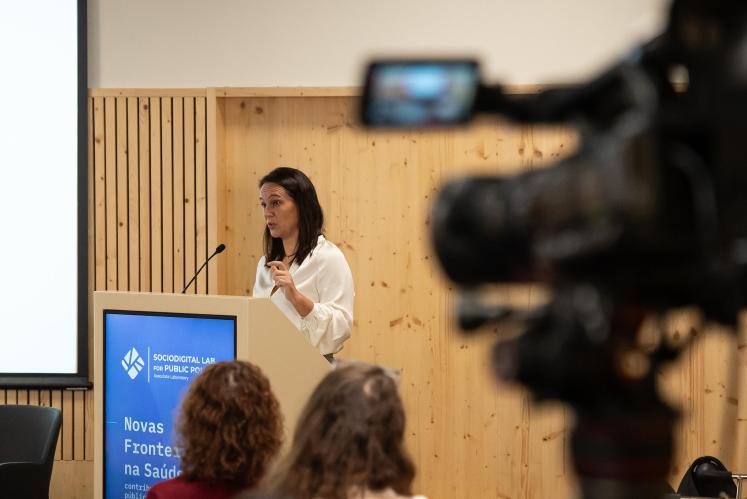1 Digital Transformation in Healthcare
Artificial intelligence (AI) and other digital technologies rapidly reshape health systems, revolutionising healthcare access and diagnosis, health workforce, and patient engagement. This digital transformation has the potential to realise universal health coverage while reducing healthcare costs. However, these opportunities come with essential risks that can only be mitigated with robust digital health governance frameworks.
According to the UN Special Rapporteur on the right to health, digital technologies for health can perpetuate several forms of discrimination, from racism and sexism to ableism. The report recalls that the same human rights must be protected both offline and online. This aim can only be achieved with strong governance frameworks that promote equity and justice in digital health.
As an illustration, Grok, a generative AI chatbot, encouraged users to submit their medical documents, such as X-rays and MRI scans, so that its AI models can be trained for image interpretability. While this service may provide health reports at low cost, it can lead to discrimination in healthcare access, insurance coverage, or employment opportunities, to cite only a few. Since access to the platform is unequal for all population sub-groups, the platform's AI algorithms may be flawed or biased, resulting in incorrect health guidance. This example illustrates the need for transparency, accountability, and ethical oversight in digital health.
2 Digital Security as a New Dimension of Human Security
Digital security focuses on digital technologies' role in protecting individuals and planetary resources from harm inflicted by digital technologies. From this perspective, digital security is a core component of human security. The Human Security Framework included in the 1994 Human Development Report encompasses seven dimensions: economic, food, health, environmental, personal, community, and political security. The report emphasised two main principles, Freedom from Fear and Freedom from Want, which became foundational to the human security approach. Digital risks such as digital divides, data breaches, online harassment, and algorithmic bias are pervasive threats that compromise people's safety and well-being. Thirty years later, digital security is needed as an eighth dimension of the human security framework to safeguard data privacy, equity and human rights.
3 Digital Security and Individual Freedoms
In his "Development as Freedom", Amartya Sen argued that development is about expanding individual freedoms, including access to services and participation in social and political life (Sen, 1999; Miletzki & Broten, 2017). In the digital realm, this translates to how access to technology can benefit people, especially those in underserved communities, to lead the lives they want.
Strengthening digital literacy, skills, and autonomy is crucial for people to use digital technologies safely. However, for these tools to be inclusive, they need to be designed with an equity lens that considers users' needs, their characteristics, and the specific contexts in which they are used. This focus on digital capabilities does not imply that access to digital technologies leads to individual freedoms; instead, it is the ethical design and implementation of technologies that enable digital capabilities to promote individual freedoms.
4 The Risks of Digital Technologies for Health
Digital transformation in healthcare can exacerbate health disparities, especially for underserved groups based on gender, ethnicity, income, age, and/or geographic location.
In its guidance for Ethics and governance of artificial intelligence for health (2021), the WHO cautioned on the unethical use of digital technologies. It stressed the need for rigorous oversight and effective governance mechanisms:
Privacy violations: Patient health records could be stolen, sold, unlawfully shared or misused by governments or corporations, affecting access to healthcare, employment, insurance, and social services.
Misuse of AI and automation: Health apps and wearable tools may provide false diagnostics or inaccurate measurements, leading to poor health decisions such as delayed healthcare.
Digital divides: Digital access gaps could create a "two-tier" healthcare system. Wealthier individuals might access face-to-face, personalised healthcare, while lower-income populations might be relegated to automated, large-scale digital interventions.
Disinformation and misinformation: Health-related mis/disinformation on social media and health apps can undermine public health responses during emergencies. For example, during the COVID-19 pandemic, false claims about vaccines compromised global vaccination efforts.
5 The Need for Governance to Ensure Digital Security
The integration of digital technologies in healthcare is inevitable. Still, its trajectory must be shaped by robust digital and data governance to manage the risks associated with using digital technologies for healthcare. Governments must ensure that their digital policies protect the well-being of individuals and the planet.
Finally, digital health governance requires the active involvement of all – governments, international organisations, civil society, and the private sector. By embedding principles of human security, data privacy, and equity into digital health governance, we can create a system that works for everyone. The stakes are too high to leave governance to chance. Collaborative action is needed to develop shared standards for digital security to protect privacy and equity and respect human rights.



